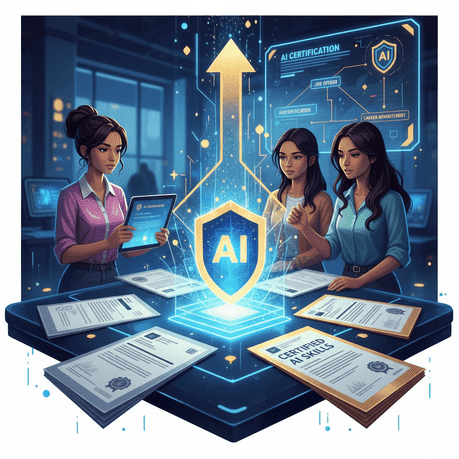How AI is Transforming Human Resources: What You Need to Know

The buzz around Artificial Intelligence in HR is more than just hype. With 76% of HR leaders believing AI will be crucial for organizational success in the near future, it’s clear that a gigantic shift is underway in how companies manage their workforce.
From applicant tracking systems to predictive analytics, AI is silently revolutionizing every facet of Human Resources. But what does this mean for HR professionals? Is AI a threat or an opportunity? Let’s dive into the transformative world of AI in HR and explore what you need to know to stay ahead of the curve.
The Evolution of HR with AI
Traditionally, HR has been a labor-intensive field, with professionals spending countless hours on tasks like recruitment, onboarding, and performance management. The transformation involves integrating service delivery, talent, and technology with HR strategy to provide more commercial value for stakeholders.
It is a deliberate method to enhance operational excellence and strategic effect over time, rather than an abrupt transformation. HR transformation entails combining service delivery, talent, and technology with HR strategy to provide more commercial value for stakeholders.
Early AI applications in HR, such as applicant tracking systems and resume screening software, have evolved into sophisticated tools that can predict employee performance, enhance engagement, and streamline administrative tasks.
This statistic underscores the transformative potential of AI in human resources. As AI continues to evolve, it is revolutionizing HR functions, making processes more efficient, data-driven, and employee-centric.
Role of AI in Recruitment
AI impacts the recruitment process in various ways:
1. AI in Candidate Sourcing: AI tools analyze vast data from online profiles, resumes, and job postings to identify potential candidates faster. They also reach passive candidates who are open to opportunities.
2. Resume Parsing and Screening: AI automates the tedious task of reviewing applications using natural language processing and machine learning. It extracts relevant information such as skills, experience, and education.
3. Chatbots for Candidate Engagement: AI-driven assistants provide immediate, personalized interactions, freeing recruiters to focus on strategic aspects of their role.
4. AI in Interview Scheduling: AI automates the coordination between candidates and hiring teams, speeding up the process and improving the candidate experience.
5. Predictive Analytics in Hiring: AI uses historical data and machine learning to forecast hiring outcomes and identify potential issues in the hiring process.
6. Video Interview Analysis: AI-driven video interview analysis offers deeper insight into candidates’ verbal and non-verbal communication, complementing traditional evaluation methods and eliminating unconscious bias.
Key AI HR Trends
AI is revolutionizing HR management through several emerging trends. Data-driven decision-making is becoming crucial, with predictive analytics enhancing talent acquisition and predictive analytics improving employee retention.
Automation of repetitive tasks, such as drafting emails and streamlining administrative processes, is increasing efficiency. Personalized employee management is on the rise, with customized training, onboarding programs, and individual career path planning.
Enhanced employee insights are being gained by analyzing digital footprints and working habits, allowing for proactive measures to maintain morale and engagement. Total rewards programs are being tailored to meet diverse workforce needs, adapting to fiscal challenges, and promoting sustainable mobility solutions.
Lastly, payroll optimization is being achieved through advanced analytics, ensuring clarity and compliance in complex payroll systems.
These trends highlight AI’s transformative impact on making HR processes more efficient, personalized, and data driven. How do you think these trends could benefit your organization?
7 AI Tools for HR Processes
Here are 7 AI tools to improve your HR processes:
1. Deel Engage: Deel Engage streamlines global talent management, career development, and performance evaluations, creating career frameworks and personalized training courses, and integrating feedback, development goals, and actionable insights.
2. ChatGPT: ChatGPT supports various HR activities, such as phrasing feedback, drafting HR policies, curating keywords for job descriptions, generating interview questions, and creating outlines for presentations.
3. Effy: Effy is a performance management tool that tracks employee performance, gathers 360-degree feedback, identifies areas for development, and provides AI-generated feedback insights.
4. Olivia: Olivia is a conversational AI assistant that navigates candidates through the application process, responds to candidate questions in multiple languages, connects with candidates through automated messaging, and manages interviews with top candidates.
5. iMocha: iMocha is an AI-powered recruitment and skills testing platform that evaluates candidates’ technical abilities, mitigates bias in recruitment, and provides comprehensive pre-employment tests.
6. Talmundo: Talmundo overcomes onboarding challenges with automated onboarding processes, personalized onboarding content, AI-powered onboarding chatbots, and intuitive reporting dashboards.
7. Leena AI: Leena AI provides automated HR support, resolving employee queries in real-time, facilitating employee surveys and feedback collection, unifying employee touchpoints and information, and delivering tailored support and guidance.
Artificial intelligence tools are transforming HR procedures by improving efficiency and decision-making. Applicant Tracking Systems (ATS) use artificial intelligence (AI) to scan resumes, match candidates to job descriptions, and forecast candidate performance using previous data.
Performance Management Systems give real-time feedback and analytics, allowing managers to monitor employee performance and find areas for improvement.
Furthermore, Employee Engagement Tools monitor employee attitude via surveys and comments, providing practical insights to improve workplace culture.
Despite its benefits, AI in HR is not without challenges. Common issues include:
- Bias in AI Algorithms: AI systems can inadvertently perpetuate biases present in the data they are trained on. To mitigate this, HR must continuously monitor and adjust algorithms to ensure fairness
- Data Privacy Concerns: With AI handling sensitive employee data, ensuring data privacy and compliance with regulations is paramount. Implementing robust data protection measures is essential.
- Need for Upskilling: As AI tools become more prevalent, HR professionals must upskill to effectively use these technologies. Continuous learning and development programs can help bridge this gap.
Becoming certified as an AI HR professional offers several advantages:
- Staying Ahead of Trends: Certification programs provide up-to-date knowledge on the latest AI HR trends and best practices, ensuring you stay ahead in the field (AIHR).
- Career Advancement: AI HR certification can enhance your career prospects by demonstrating your expertise in leveraging AI to improve HR functions (AIHR).
- Organizational Impact: Certified professionals can drive significant improvements in their organizations, from optimizing recruitment processes to enhancing employee engagement (AIHR).
Conclusion
AI is undeniably transforming HR, making it more efficient, data-driven, and employee-centric. By addressing common challenges and leveraging the right tools, HR professionals can uncover the full potential of AI.
To stay competitive and enhance your HR skills, consider enrolling in the AI certifications. Equip yourself with the knowledge and skills to lead your organization into the future of HR.
Take the next step in your HR career by enrolling in the AI+ Human Resources™ certification. Equip yourself with the knowledge and skills to lead your organization into the future of HR.
Recent Blogs

FEATURED
How Financial Institutions Can Standardize AI Skills with Authorized Training Partners
December 18, 2025
FEATURED
HR Leaders: Standardize AI Skills Across Roles with Authorized Training Partners
December 18, 2025
FEATURED
AI Training for Healthcare: Compliance-Ready Certifications for Clinical Staff
December 18, 2025
FEATURED
AI Training for Healthcare, BFSI, and Legal: Compliance Made Simple
December 18, 2025
FEATURED
Why AI Certification Adds a Competitive Edge to Student Resumes
December 18, 2025

